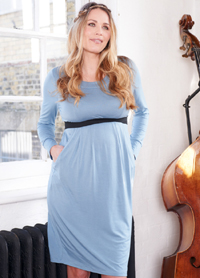
The human gestation period is approximately 40 weeks in duration, divided into three trimesters. Specific foetal developments occur in each of the trimesters and a pregnancy is deemed to be full-term at 40 weeks.
Changes: for the infant and mother
During each of the trimesters, important changes and developments occur for the developing baby and its mother. As the baby grows and the mother’s body changes to accommodate and nurture the infant, maternity clothing is needed and, following the baby’s birth, many women then need suitable breastfeeding clothes.
The First Trimester (0-13 Weeks)
Of all of the trimesters, the first is the most pivotal and important to the development of a baby. The body structure and organ systems of the baby develop during these early weeks and it is understood that most miscarriages and birth defects take place during this trimester.
Significant changes to the body of the mother also occur in the first trimester. Hormonal changes frequently result in a range of often unpleasantly experienced symptoms which may include: fatigue, nausea, tenderness of the breasts and the need to urinate frequently.
Despite the fact that these symptoms are common during pregnancy, they are experienced differently by every woman and, often, in every pregnancy. While some people may have increased energy levels, others feel much more tired and emotional than usual.
This can be a particularly difficult time of pregnancy for some women as although they may feel very different to usual, there may be few outwardly visible signs of their pregnancy. Many women are able to wear their own clothes and do not have too much of a belly in the early stages of pregnancy.
The Second Trimester (14 to 26 Weeks)
For many women, the second trimester of pregnancy is lovely – so much so that it is sometimes called the ‘golden period’. Comparatively, the second stage of pregnancy is more pleasant because symptoms of nausea and extreme fatigue typically decrease and improved sleep and energy levels are enjoyed.
This is not to say that no new symptoms will be experienced. During the weeks of the second trimester, some women experience a range of new symptoms that may include: constipation, heartburn, abdominal pain, back pain and leg cramps.
Usually between 16 and 20 weeks gestation, the baby’s first movements may be felt and this can be incredibly exciting. After feeling the first movements, many women find that their baby’s movements quickly becoming more strong, frequent and forceful.
It is also likely that, during the second semester, the expectant mother will look decidedly pregnant but will not feel too heavy or uncomfortable as a result of her size and ever-changing form.
The Third Trimester (27 to 40 Weeks)
In the final trimester of pregnancy, many women feel excitement about the approaching birth and meeting their baby, together with a real desire for things to hurry along.
Because of the large weight that a woman typically carries at this stage, a number of symptoms tend to be experienced as a result of her increased size. By this stage, the uterus carries not only a baby, but also the placenta and approximately one litre of amniotic fluid and so feelings of discomfort are not surprising.
In the third trimester, some women experience: shortness of breath as the growing uterus reduces lung capacity, difficulty sleeping, urine leakage, skin changes (such as: varicose veins, itchy skin and stretch marks).
During the third trimester, it is important to prepare for labour and acknowledge that it is perfectly normal to feel anxious about the birth (particularly if expecting your first child). Because the baby will soon be born and brought home, the third trimester is also a good time to ensure that the home is ready for the baby’s arrival.
The three trimesters of pregnancy each bring different changes, challenges and reasons for excitement. Thorough all trimesters, an expectant woman should take care to protect their own health and well-being and that of their baby.